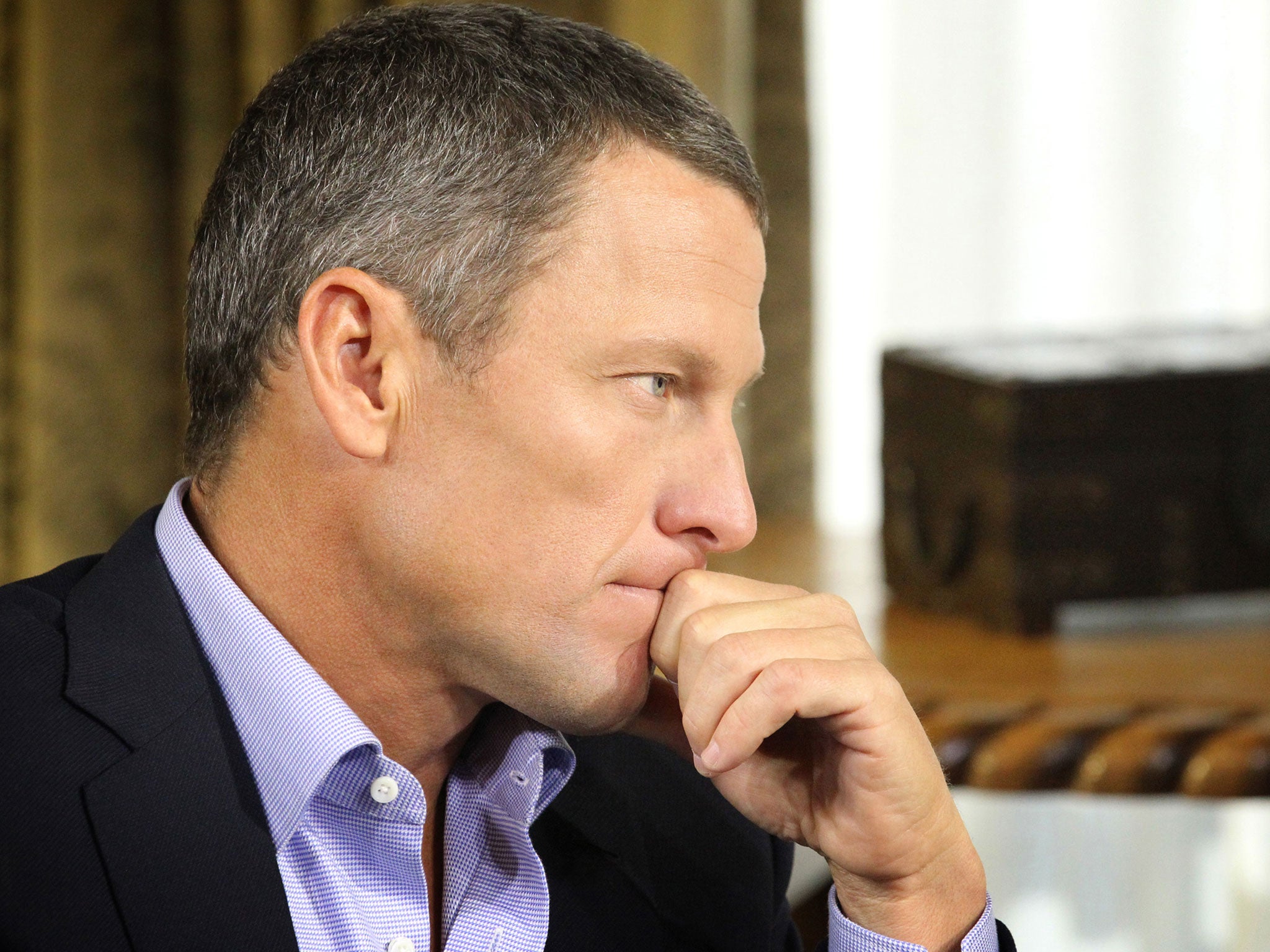Lance Armstrong accuses former UCI president Hein Verbruggen of helping him cheat during 1999 Tour de France
Disgraced cyclist accuses governing body of concealing his doping

Your support helps us to tell the story
From reproductive rights to climate change to Big Tech, The Independent is on the ground when the story is developing. Whether it's investigating the financials of Elon Musk's pro-Trump PAC or producing our latest documentary, 'The A Word', which shines a light on the American women fighting for reproductive rights, we know how important it is to parse out the facts from the messaging.
At such a critical moment in US history, we need reporters on the ground. Your donation allows us to keep sending journalists to speak to both sides of the story.
The Independent is trusted by Americans across the entire political spectrum. And unlike many other quality news outlets, we choose not to lock Americans out of our reporting and analysis with paywalls. We believe quality journalism should be available to everyone, paid for by those who can afford it.
Your support makes all the difference.Fourteen years on, the first of the smoking guns in the Lance Armstrong scandals – and one which could have cost him the 1999 Tour de France – began spitting bullets again after the Texan claimed former UCI President Hein Verbruggen had been involved in one of Armstrong’s cover-ups for drugs in the race.
Armstrong claimed in an interview with the Daily Mail that the former president of cycling’s governing body had turned a blind eye when Armstrong needed a backdated prescription for a saddle sore following a positive test for cortisone during the 1999 Tour, the first of seven the American won. The backdated prescription, allowing Armstrong to use a banned substance in small doses for medical purposes, cleared him of a doping positive.
Verbruggen did not answer calls from The Independent today, but insisted a few weeks ago that his behaviour as UCI President had been irreproachable.
“I have never acted inappropriately and my conscience is absolutely clean,” the Dutchman said in a letter sent to federations. “With the benefit of hindsight, however, I admit that I could have done some things differently, but I do not accept that my integrity is in doubt.”
At the time, the cortisone scandal marked a critical juncture in the saga of Armstrong in the Tour. For journalists like myself who had covered the Festina scandal in the 1998 Tour, suspicion of any outstanding sporting achievement was predictable. French newspaper L’Equipe showed that with their ambiguous headline after Armstrong took the lead: “On another planet”.
But as the race, led by Armstrong, headed out of the Alps and through the Pyrenees towards Paris, those doubts ebbed. Instead, there was widespread admiration at Armstrong’s comeback from cancer and what felt like the best thing, post-Festina, that could happen to cycling. However, the cortisone positive scandal, broken by Le Monde in the Tour’s third week marked the point where Armstrong’s irreparable breach with the media began to take shape.
Armstrong, not tainted by the events of the previous year because he was not on the race, became, as he put it, “confrontational and combative”, while the atmosphere in the Tour pressroom grew tense.
“Le Monde practices vulture journalism” Armstrong snapped bitterly as he stared balefully at journalists, before stating deliberately slowly, “I had a saddle sore.” “Are you calling me a doper or a liar?” he lashed out at one reporter.
Armstrong was finally cleared in 1999, and wore yellow into Paris for the next six years but the atmosphere was poisoned – for good.
In a recent interview with Cycling News, Armstrong explained that he did not feel he was singled out for favourable treatment over the cortisone incident and in his interview with The Mail, he expanded that claim by saying, “the real problem was, the sport was on life-support.”
Armstrong added: “Hein just said, ‘This is a real problem for me, this is the knockout punch for our sport, the year after Festina, so we’ve got to come up with something.’ So we backdated the prescription.”
With the considerable benefit of hindsight, had the positive been confirmed, then Armstrong would have lost the Tour – and the sport could arguably be in a better place today.
Join our commenting forum
Join thought-provoking conversations, follow other Independent readers and see their replies
Comments